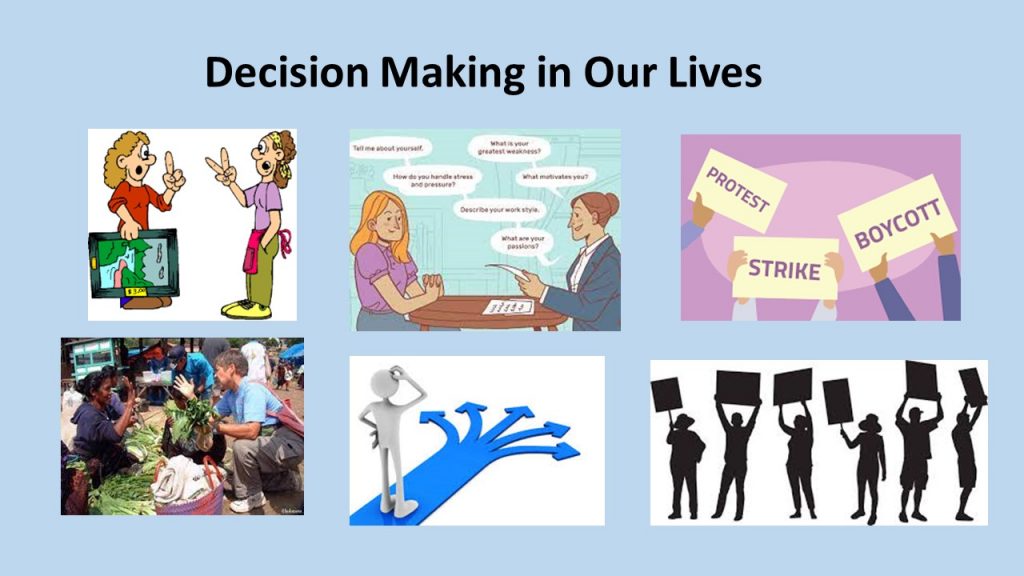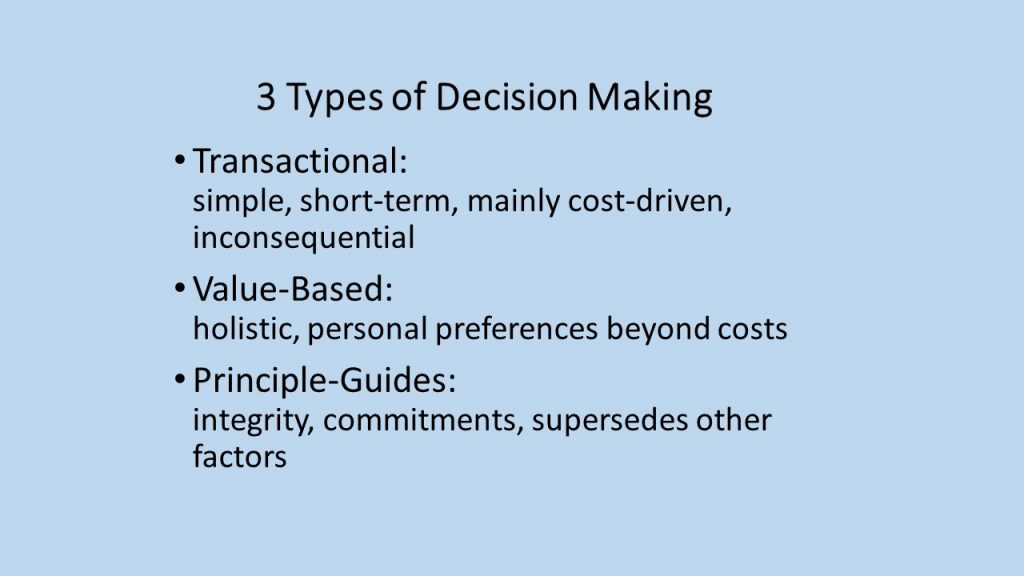
142. How Do You Make Decisions? | 你,是如何作決定的?
– Musings of Dr. Jamie C. Hsu, 7.30.2022
We all make decisions, big and small, day in and day out. Have you ever analyzed how you make those decisions? Depending on the situation and importance, you may use one of the following criteria:
- Transactional Decision:
This is a simple way we make many daily decisions such as grocery shopping, eating out, and other activities that involve spending money. We look for the best deals and the most cost-efficient way to get what we want. Even while job searching, we compare the wages and salaries offered by potential employers. Transactional decision-making is focused on the short term and a single event. The comparative analysis is simple, and the decision-making is quick and has no significant consequences.
- Value-Based Decision:
In this type of decision, value assessment and personal preferences come into play. The price you pay for an item may not be as important as its value and importance to the buyer and the seller. Buying a thousand-dollar handbag is such an example. The decision was based not on cost, but on the joy of ownership and the status symbol. In determining a career change, you may consider more than the money. Is the job interesting? How will it impact family life? What are the advancement opportunities and the work environment? Many factors come into play. Both tangible and intangible factors are considered and compared. All these factors can be included in a comparison table and assigned numerical values for visible analysis and decision-making.
3. Principle-Guided Decision: In some situations, personal principles may become the deal breaker. For instance, you may not want to work for any company that violates human rights or damages the environment. Or, you may not want to take a job that requires extensive travel because you may miss many family and school activities for your children.
Of course, in real life, everyone will have a preferred way of making decisions. The three criteria listed above are often used by us. We just need to explicitly be aware of that and consider the appropriate important factors so we can make better, faster, and more durable decisions in life.
Please examine how you make decisions in life. It might be very revealing and teach you something about yourself.


你,是如何作決定的?(2022/07/30)
-作者 許俊宸博士
-中譯 薛乃綺
我們日復一日地在做著各種大大小小的決定。你有沒有分析過你是如何做出這些決定的?根據情況和重要性,你可能使用以下這些標準:
- 交易決策
這是我們作出許多日常決定的一種簡單方式,例如:購物、外出用餐、以及其他消費活動。我們尋找最優惠的價格和最具成本效益的方式,來獲得我們想要的東西。即使在求職時,我們也會比較一些潛在雇主所提供的工具及薪資。这种交易決策注重於短期和單一事件。比較分析簡單、決策迅速,不會有重大影響。
- 考量價值的決策
在這種類型的決策中,價值評估和個人偏好開始發揮作用。您為一件物品支付的價格,可能不如它的價值和對買賣雙方的重要性那麼重要。購買几千美金的手提包就是一個例子: 您可能會考慮的是擁有它的快乐,和它带給你的身价, 而不是它的成本。 還有在決定轉行工作時,人們可能會考慮的不僅僅是薪錢。工作有趣嗎?它將如何影響家庭生活?晉升機會如何,工作環境如何?許多因素都在起作用。有形和無形的因素都被考慮和比較。所有這些因素都可以被包含在一个比較表中,用可見的分析和分配的數據来做決策。
- 原則性決策
在某些情況下,個人原則可能會是交易最要紧的決定因素。例如,一個人可能不想為任何侵犯人權或破壞環境的公司工作。又或者,你不想從事需要頻繁旅外出差的工作;避免你可能因此錯過許多的家庭及孩子學校的活動。
當然,在現實生活中,每個人都會有自己偏好的決策方式。通常,我們會使用上面所提到的三種決策標準。我們只需要明確地意識到這一點,並考慮合適的重要因素。這樣,我們就可以在生活中作出更好、更快、更持久的決定。
請檢視你如何在生活中作出決定。它可能非常具有啟發性、並能告訴你某些關於自己的个性和人生观。


